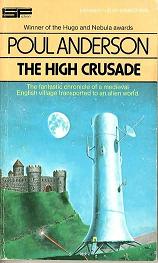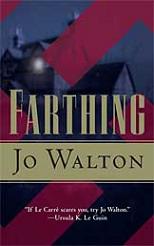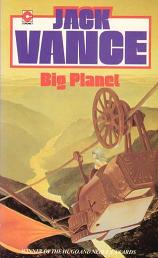The visceral anger and loathing some science fiction fans can display when confronted with anything that’s different from “how we did things thirty years ago”. In this case it’s one Taral Wayne, complaining in The Drink Tank #259 (PDF) about the wrong people winning the Best Fanwriter and Best Fanzine Hugos. With the first award, Taral was offended that Frederik Pohl had won the award, because he didn’t consider him to be a fan and blamed the voters and voting committee for not realising this:
My point is this: Pohl spelled it out, right there in his blog, that these were early drafts for a new edition of the old book. How much more plainly must he tell us that this is not fanwriting?
I think we can say why the voters nominated a professional writer for his blog. Many had likely never seen more than a small number of fanzines, perhaps only con publications such as the Worldcon’s own progress reports. I’ll make a further guess that most of the voters have little appreciation for what fanzines do, beyond discussing science fiction. They can have no sense of fanzine fandom as a community, or of fanzines as a means of expression rather than information. It is self-evident that this must more or less be the case, since there are only two or three hundred fans involved in the fanzine network at any given time… but several thousand Worldcon members with a vote.
What puzzles me is why the Hugo committee permitted Pohl’s name to appear on the ballot. If the rules are to mean anything, his name had no business being there. But odds are that the committee members were no better informed about fanzines than the majority of voters.
What annoys me about Taral’s reasoning is that a) he doesn’t engage the quality of Pohl’s work, just argues his blog has to be disqualified as fan writing because it might end up as source material for a new autobiography and b) that he accuses the Hugo voters and administration of being ignorant. That last slur is the first thing every loudmouth trots out when the Hugo votes don’t got the way they want it and honours the wrong people. It’s never “the voters disagreed with me on the quality of the candidates for Best Novel, it’s always “Harry Potter should not have won because it’s fantasy, but the voters are so ignorant that they don’t even know it’s a science fiction award”. Bonus points if, like the example here, they themselves gets basic facts about the Hugos wrong. At least Taral does acknowledge that professional writers can and have been honoured for their fan work, even if he’s boneheaded about Pohl not being a real fan for the purpose of the award.
You can certainly argue whether Frederik Pohl deserved the award, but to say that his blog should be disqualified because he may some day be paid for the material he publishes there is stupid. But apart from that Taral has no argument: if posts about the earliest days of not just organised fandom but science fiction as a genre, days Pohl was around for, isn’t fannish enough to qualify, than what is?
(As an aside, thousands may have the right to vote in the Hugos, but only 558 people did for Best Fan Writer, so Taral’s two-three hundred fanzine fans could’ve easily swung the vote to a more deserving candidate had they agree with him and/or had a con membership. Also, I wonder how accurate his guesstimate is here, or whether he’s defining fanzines too narrowly. My guess is the latter.)
Speaking of fanzines, that was his other beef with this years Hugo winners:
The fanzine Hugo has been corrupted, just as the fanwriter Hugo has been. Last year, a webpage called Electric Velocipede encouraged its viewers to vote, and succeeded in taking the award from conventional media for the first time. The debate over whether or not a webpage is a fanzine is far from over. There are arguments for both views. But this year the issue was quite clear. The winner, StarShipSofa, is a podcast. Under what conceivable circumstances can a dramatic presentation be compared to the written media? To bring up apples and oranges is a tired cliché. Let’s use a different analogy. Allowing a podcast to compete with fanzines for the Hugo makes as little sense as judging between a Gene Kelly musical comedy and a lecture by Mark Twain.
(See? I was right)
As I said on File 770, this is a luddite attitude for a science fiction fan to take, confuses form with content and is clearly elitist to boot. As long as StarShipSofa does what expect from a fanzine, it’s a fanzine, one being done through voice rather than print, just like an audio book is still a book. If you look at the contents of any given issue it’s clear that whatever Star Ship Sofa is doing does not differ greatly from a print ‘zine. The format should not matter, the content should. And Taral isn’t just dismissive of audio fanzines, but also talks about whether or not a webpage can be a fanzine.
It’s this sort of attitude that I call luddite, with excuses to the historical luddites, whose attitude to technological progress was not half as unreasonably negative as this. There’s something absurd in having science fiction fans of all people reject creative uses of new technology, new and perhaps better ways to keep the conversation going.


